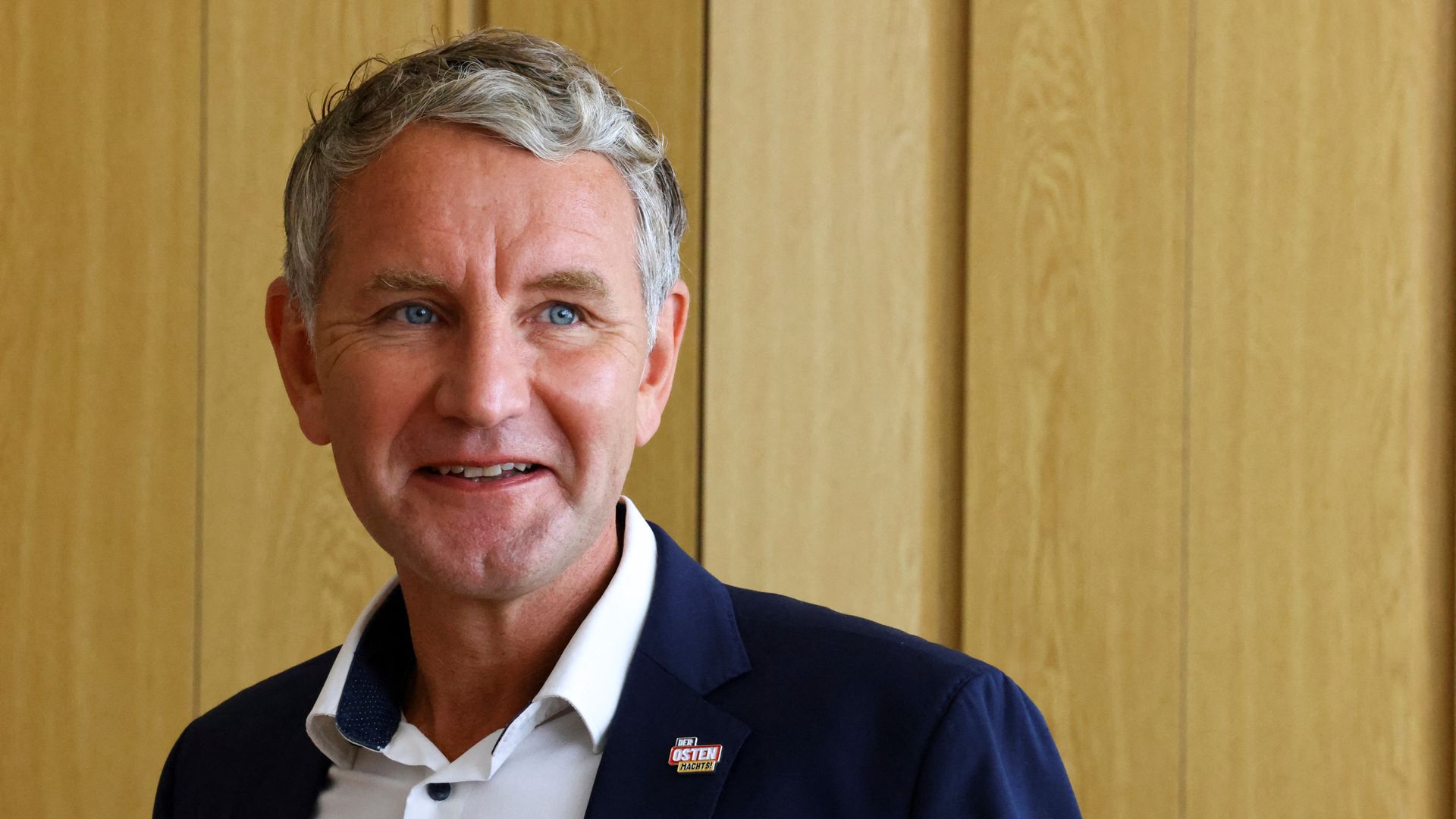The far-right Alternative for Germany (AfD) party is on track to win a state election for the first time in the country.
AfD, founded in 2013 with an anti-migration and eurosceptic agenda, picked up the most votes in the eastern state of Thuringia, according to an exit poll.
The party was on course for 33.5% of the vote compared to 23.4% in the 2019 election, followed by mainstream conservatives – the centre-right Christian Democratic Union (CDU) – on 24.5%.
It is the first time a far-right party looks set to have won the most seats in a German state parliament since the Second World War.
But AfD was almost certain to be excluded from power by rival parties.
AfD also performed well in the eastern state of Saxony, where it was a close second behind the CDU by just half a percentage point, the ZDF poll suggested.
The CDU which has governed Saxony since German reunification more than 30 years ago and is the main opposition party at national level, appeared set to secure 32% of the vote in the state.
Middle East latest: Protesters block roads and clash with security forces amid anger at Netanyahu after bodies of hostages recovered
Who are the six Israeli hostages confirmed dead?
Hvaldimir: Russian ‘spy’ whale found dead in Norway
But the AfD was narrowly behind with 31.5% on Sunday, according to the poll.
Europe correspondent
The exit polls predicting the far-right Alternative for Germany party (AfD) has won the most seats in Thuringia’s state parliament sparked both celebration and devastation.
Huge cheers erupted from the pub where the party faithful were holding their watch party.
The news they were coming a close second in neighbouring Saxony will have buoyed them further.
If the win in Thuringia is confirmed, this will be the first time since World War Two that a far-right party has the most seats in a German state parliament.
Anti-immigration, populist messages of “Germany first” appealed to many voters in the former communist east where numerous people told me they feel forgotten or disconnected from the national government.
But other residents who were casting their votes in Erfurt on Sunday were deeply unnerved by the idea that the far-right might seize victory.
They know that a pact by other parties not to go into coalition with the AfD means it is unlikely to get full control of Thuringia’s parliament but the fact it has won such a huge slice of support is disturbing to some who fear Germany is stepping in a dangerous direction.
The AfD in Thuringia is being monitored by state intelligence authorities as “extremist”, and their top candidate, Bjorn Hocke, was this year found guilty of using a banned Nazi slogan – yet it appears one in three voters still backed them.
That has disturbed some Germans, as voter David warned: “In our history, we have had national socialist movement in 1933 in Weimar and hopefully we will not repeat it again.”
About 3.3 million people were eligible to vote in Saxony and nearly 1.7 million in Thuringia.
The left populist Sahra Wagenknecht Alliance (BSW), which like the AfD demands stricter controls on immigration and wants to stop arming Ukraine, came third in both states, with up to 16% of the vote in Thuringia and 12% in Saxony.
Setback for German chancellor’s coalition
The far-right success is a blow to the coalition of German Chancellor Olaf Scholz just a year before the federal election in September 2025.
Mr Scholz’s Social Democratic Party (SPD) currently governs nationally with the Greens and liberal Free Democrats (FDP). Those parties were set for weak results on Sunday.
AfD is unlikely to be able to form a state government as it is short of a majority and other parties refuse to collaborate with it.
AfD is strongest in the formerly communist east, and the domestic intelligence agency has the party’s branches in Saxony and Thuringia under official surveillance as “proven right-wing extremist” groups.
Immigration was pushed to the top of the country’s political agenda after three people were killed in a knife attack by a suspected Islamic extremist at a festival in Solingen, western Germany, on 23 August.
Keep up with all the latest news from the UK and around the world by following Sky News
Be the first to get Breaking News
Install the Sky News app for free
On Thursday, AfD’s leader in Thuringia Bjoern Hoecke told a campaign event in Nordhausen: “Our freedoms are being increasingly restricted because people are being allowed into the country who don’t fit in.”
The former history teacher is a polarising figure who has called Berlin’s memorial to Nazi Germany’s Holocaust of Europe’s Jews a “monument of shame”.
He was convicted earlier this year for using a Nazi slogan at a party rally.
This breaking news story is being updated and more details will be published shortly.
Please refresh the page for the fullest version.
You can receive breaking news alerts on a smartphone or tablet via the Sky News app. You can also follow @SkyNews on X or subscribe to our YouTube channel to keep up with the latest news.










